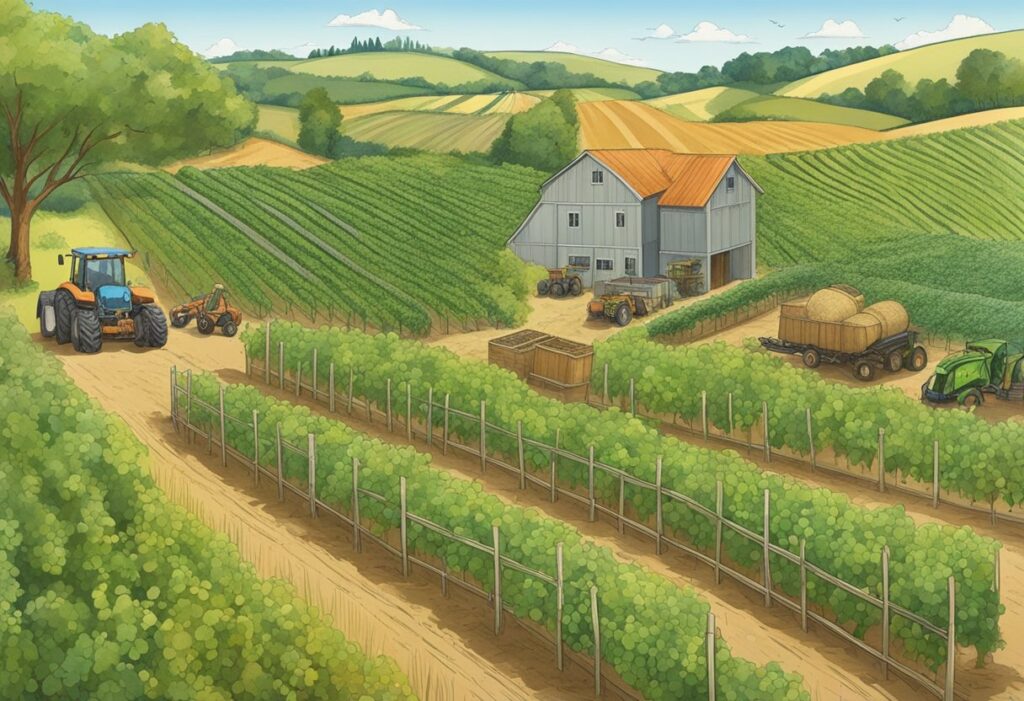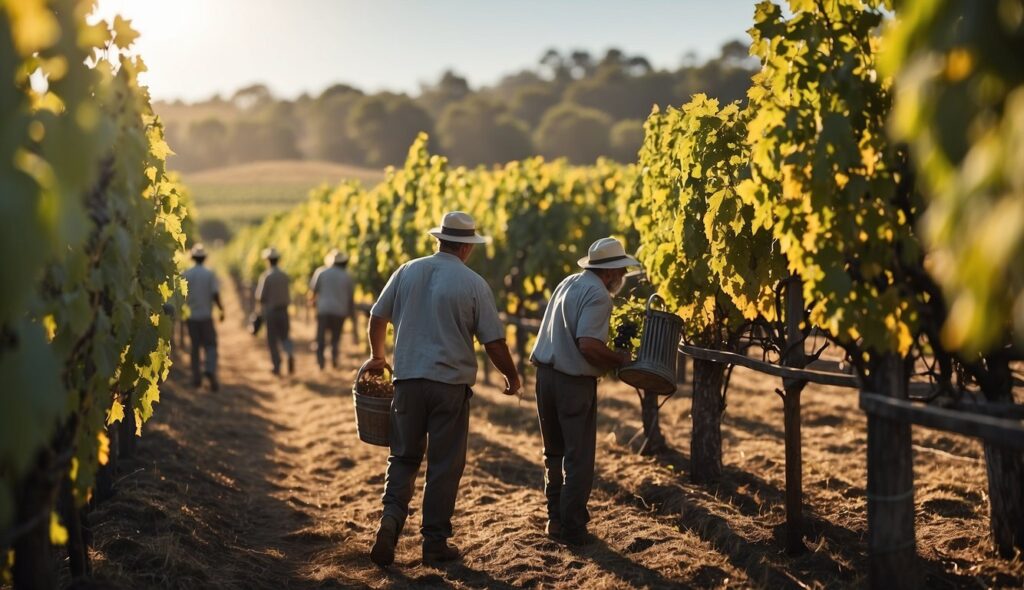During the Enlightenment, a revolution in thought brought significant changes to many fields, including viniculture. The shift from traditional to scientific approaches in viniculture transformed wine production, enhancing quality and expanding knowledge. Viniculture evolved from relying solely on historical methods to incorporating scientific techniques, improving grape cultivation and wine making.

As the capacity for reason and scientific inquiry grew, so did the interest in applying these principles to everyday practices. In viniculture, this meant utilizing new scientific discoveries to optimize grape growing and wine production. The public sphere, where ideas could be shared and debated, played a huge role in spreading these new methods. Institutions and publications began promoting the benefits of a more scientific approach to viticulture.
With this newfound focus on science, growers experimented with environmentally friendly practices like organic and biodynamic viticulture, aiming for sustainability and better resource use. These advances not only improved the efficiency of wine production but also contributed to a deeper understanding of agricultural impacts on ecological systems. As you explore this topic, you’ll discover how the Enlightenment’s dedication to rational thought reshaped the world of wine.
Historical Context of Viniculture

Viniculture has deep roots spanning various ages and cultures, each impacting its methods and significance. This section explores ancient winemaking practices, medieval perspectives, and the influence of the Renaissance.
Ancient Practices and Medieval Perspectives
The practice of viniculture began thousands of years ago. In Ancient Wine, winemaking dates back to the Neolithic period. The ancient Greeks and Romans played pivotal roles in cultivating grapevines. Romans utilized innovative techniques and constructed the first wineries.
During the Middle Ages, the Catholic Church became a major influencer. Monasteries preserved and advanced winemaking methods. With religion emphasizing wine usage in sacraments, viticulture flourished. Monks tended vast vineyards, ensured quality production, and recorded detailed observations which improved techniques over time.
Renaissance Influence and Transition
The Renaissance was a period of significant change for viniculture. Inspired by cultural and scientific advancements, new winemaking techniques emerged. Improved agricultural tools and practices allowed more accurate care of vineyards. The rise of scientific thought encouraged experimentation, leading to better understanding of the fermentation process.
Trade expanded as well, spreading innovative practices across Europe. For instance, the Renaissance winemaking techniques shaped modern viticulture. New laws were enacted, regulating wine trade and ensuring quality. This period marked a transition from traditional methods to more scientific and organized approaches, laying the groundwork for Enlightenment-era viniculture developments.
By understanding these historical contexts, you appreciate the rich heritage and evolving methodologies that shaped the viniculture field you see today.
Enlightenment Ideals and Scientific Progress

During the Enlightenment, ideals such as progress and reason greatly influenced scientific thinking. Key figures like Francis Bacon, John Locke, and Isaac Newton shaped the development of the scientific method and transformed views on nature and human knowledge.
Philosophical Foundations
The Philosophical Foundations of the Enlightenment lay in the belief that human reason could uncover the truths of the natural world. Thinkers such as John Locke argued that knowledge comes from experience and observation. This view challenged older beliefs that placed authority in religious or traditional interpretations.
Francis Bacon emphasized the importance of inductive reasoning. He believed that gathering data through observation and experiments was crucial. Bacon’s approach laid the groundwork for modern scientific investigation.
The idea of progress was central to this era. Enlightenment philosophers held that through science and reason, humanity could continually improve and better understand the world.
Emergence of Scientific Methodology
The Emergence of Scientific Methodology during the Enlightenment was marked by a shift from traditional approaches to a more systematic scientific method. Isaac Newton played a significant role with his work in physics and mathematics, showcasing how formal methodologies could lead to groundbreaking discoveries.
Scientific principles started to focus more on empirical evidence and repeatable experiments. This shift led to more accurate and reliable knowledge. The Scientific Revolution provided tools and techniques that would improve various fields, including viniculture.
The Enlightenment’s embrace of reason and systematic inquiry fostered an environment where scientific progress was not only possible but expected. This change allowed scientists to make discoveries that would have been inconceivable in earlier times.
By adopting these methodologies, viniculture and other fields saw remarkable advances, elevating the quality and consistency of their practices.
Practical Changes in Viticulture

During the Enlightenment, viticulture saw significant practical changes that were influenced by new scientific approaches. These changes included the use of experimental techniques and a deeper understanding of botany and soil science to improve grape cultivation.
Adoption of Experimental Techniques
You can see real progress in viticulture during this period with the adoption of experimental techniques. Farmers started using the scientific method to test different growing conditions and practices.
For example, they experimented with various pruning methods to find out which produced the best yield. They also tested different watering schedules. These practices helped to figure out the most effective ways to produce high-quality grapes.
In addition, tools and equipment were improved. Simple yet effective tools like more precise pruning shears and innovative trellis designs made a huge difference in vineyard management. This practical shift not only increased productivity but also ensured the consistent quality of grapes, which is essential for good wine.
Botanical Studies and Soil Science
Botanical studies played a crucial role in advancing viticulture. During the Enlightenment, you would notice a keen interest in understanding the grapevine itself. Scientists studied the botany of grapevines, learning about different grape varieties and identifying characteristics that made them thrive. They discovered that certain vines were naturally resistant to diseases, leading to healthier crops.
Soil science also made significant strides. Agriculturalists paid close attention to the types of soil that best supported grape growth. They began to identify the importance of soil pH, natural minerals, and the impact of various soil compositions on the flavor of grapes. This knowledge allowed growers to amend soil conditions to match the needs of specific grape varieties, enhancing both the yield and quality of wine.
These practical changes reflect the shift from traditional methods to a more scientific and methodical approach, which greatly benefited the viticulture industry during the Enlightenment.
Sociopolitical Effects on Scientific Adoption

In the Enlightenment, sociopolitical factors like government policies and economic conditions, along with existing social hierarchies and land ownership structures, played crucial roles in adopting scientific methods in viniculture.
Government and Economics
Governments during the Enlightenment, including France and other European countries, encouraged scientific approaches in various fields. Enlightened despots like Catherine the Great supported scientific research, providing funding and resources.
Economic incentives also drove the shift. Wine production was a significant industry, and increasing efficiency and quality meant higher profits. This economic motivation pushed vineyard owners to adopt new scientific methods, targeting advancements in soil analysis and crop management. You could see government-supported institutions sharing the latest research on vineyards and encouraging modernization.
Table: Key Economic Drivers
| Factor | Impact on Viniculture |
|---|---|
| Government Funding | Research and development |
| Economic Incentives | Higher quality and profits |
| Industry Importance | Focus on efficiency |
Social Strata and Land Ownership
Social hierarchies and land ownership dynamics heavily influenced the acceptance of scientific methods in viniculture. Typically, the wealthy elite, who owned large estates, were the early adopters of scientific techniques. They had the resources to invest in research and new technologies, while small-scale farmers adhered more to traditional methods due to limited financial means.
The Church, owning vast tracts of vineyard land, also played a part. Some Church officials embraced scientific advancements to enhance production, influencing other landowners. The period leading to the French Revolution marked significant changes, weakening feudal structures and serfdom, promoting a broader acceptance of new practices.
Bullet Points: Influential Entities
- Elite and Wealthy Landowners: Resources for investment
- Church: Influence and vast land ownership
- Serfdom and Feudal Shifts: Evolving post-French Revolution
France saw significant transformations as social and political landscapes evolved, making room for scientific enlightenment to gradually replace traditional approaches in viniculture.
The Enlightenment’s Legacy in Modern Viniculture

You can see the impact of the Enlightenment’s ideas in today’s viniculture through the use of scientific methods and modern technology.
During the 18th century, Enlightenment thinkers advocated for a rational approach to agriculture. This meant using observation and experimentation to improve outcomes. Today, scientific methods drive many advancements in winemaking.
Modern Science has revolutionized viniculture by introducing techniques such as:
- Precision Agriculture: Using drones and satellites to monitor and manage vineyards.
- Genetic Research: Developing disease-resistant grape varieties.
- Climate Control: Installing advanced climate control systems in vineyards.
The Scientific Revolution laid the groundwork for these innovations. By emphasizing experimental science, it encouraged a shift away from traditional, superstitious practices.
Education also plays a crucial role. Many winemakers now hold degrees in viticulture and oenology, fields that combine traditional knowledge with state-of-the-art research. Universities and agricultural colleges offer courses that cover everything from soil science to fermentation technology.
The ideas of the Enlightenment encouraged rational thinking and empirical evidence. This approach is now core to modern viniculture. New methods for pest control, soil management, and fermentation have all been developed through rigorous testing and study.
Furthermore, today’s wineries often collaborate with research institutions. Partnerships with universities and agricultural extensions fuel continuous improvements and innovations in the industry.

